Đề thi thử THPT Quốc gia môn Tiếng Anh - Mã đề 132 - Năm học 2014-2015 - Trường THPT Lương Ngọc Quyến (Có đáp án)
I. PHẦN TRẮC NGHIỆM:
Question1: Choose the word whose main stress is placed differently from the others.
A. irrigate B. ancestry C. delicate D. cosmetic
Question2: Choose one best option to complete the sentence by circling the corresponding letter A,
B, C, D.
- "Happy birthday! This is a small present for you." - “____________”
A. What a pity! B. Have a good time!
C. How beautiful it is! Thanks. D. How terrible!
Question3: Choose one best option to complete the sentence by circling the corresponding letter A,
B, C, D.
Air constricted between the vocal chords makes them _________ producing sounds
A. to vibrate B. vibrating C. vibrate D. the vibration
Question4: Choose one best option to complete the sentence by circling the corresponding letter A,
B, C, D.
- “_________________” - " Oh, its' great!"
A. What do you think of the music of the film? B. What do you like the music of the film ?
C. How is the music of the film like? D. Would you like the music of the film?
Question5: Choose one best option to complete the sentence by circling the corresponding letter A,
B, C, D.
The first customer ______ this morning was quite rude.
A. dealing with B. to deal with
C. dealt with D. with whom we dealt
Question6: Mark the letter A, B, C, or D to show the underlined part that needs correction
UNICEF was created in 1946 help bring food and medicine to children who suffered during
A B C D
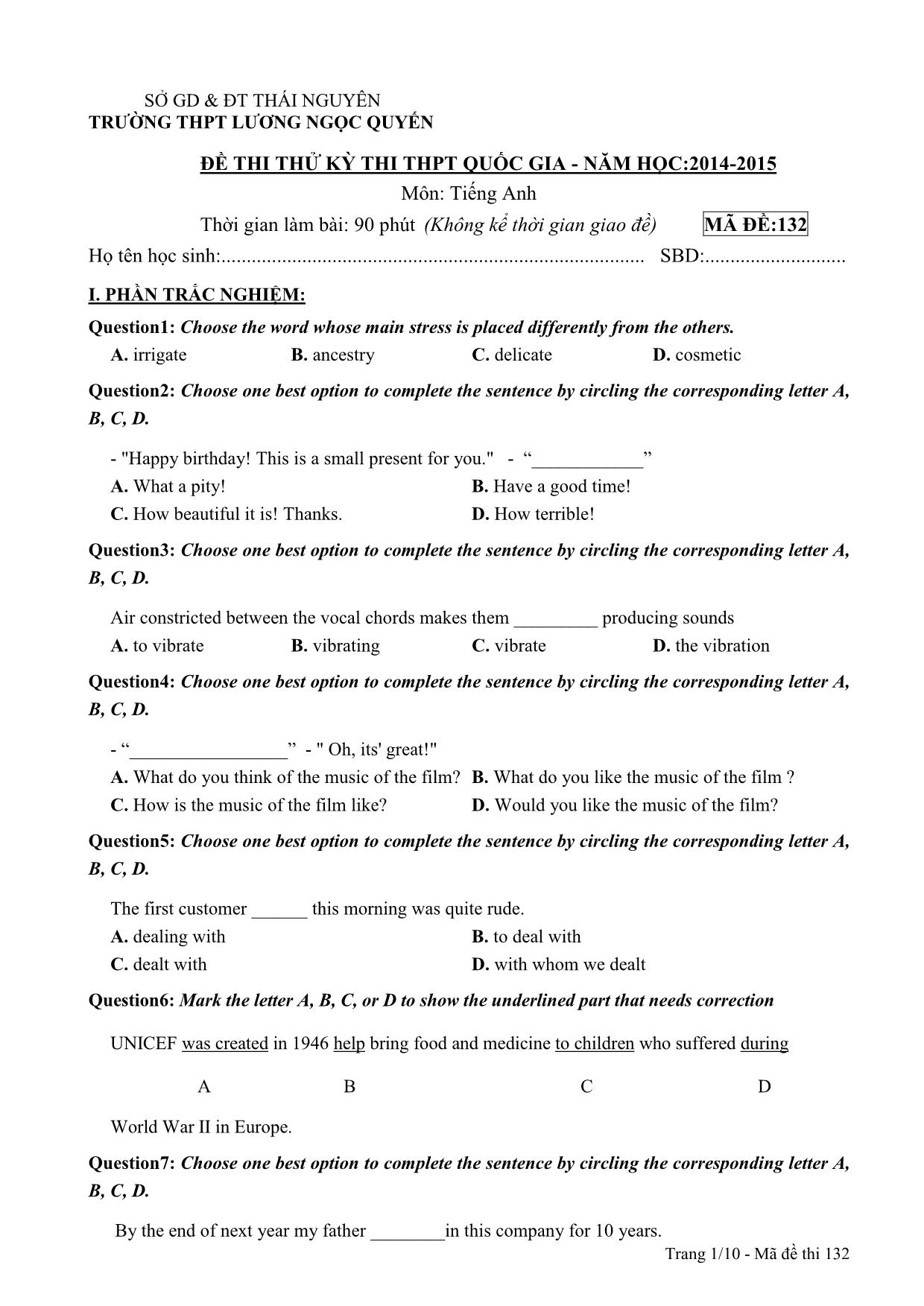
Trang 1
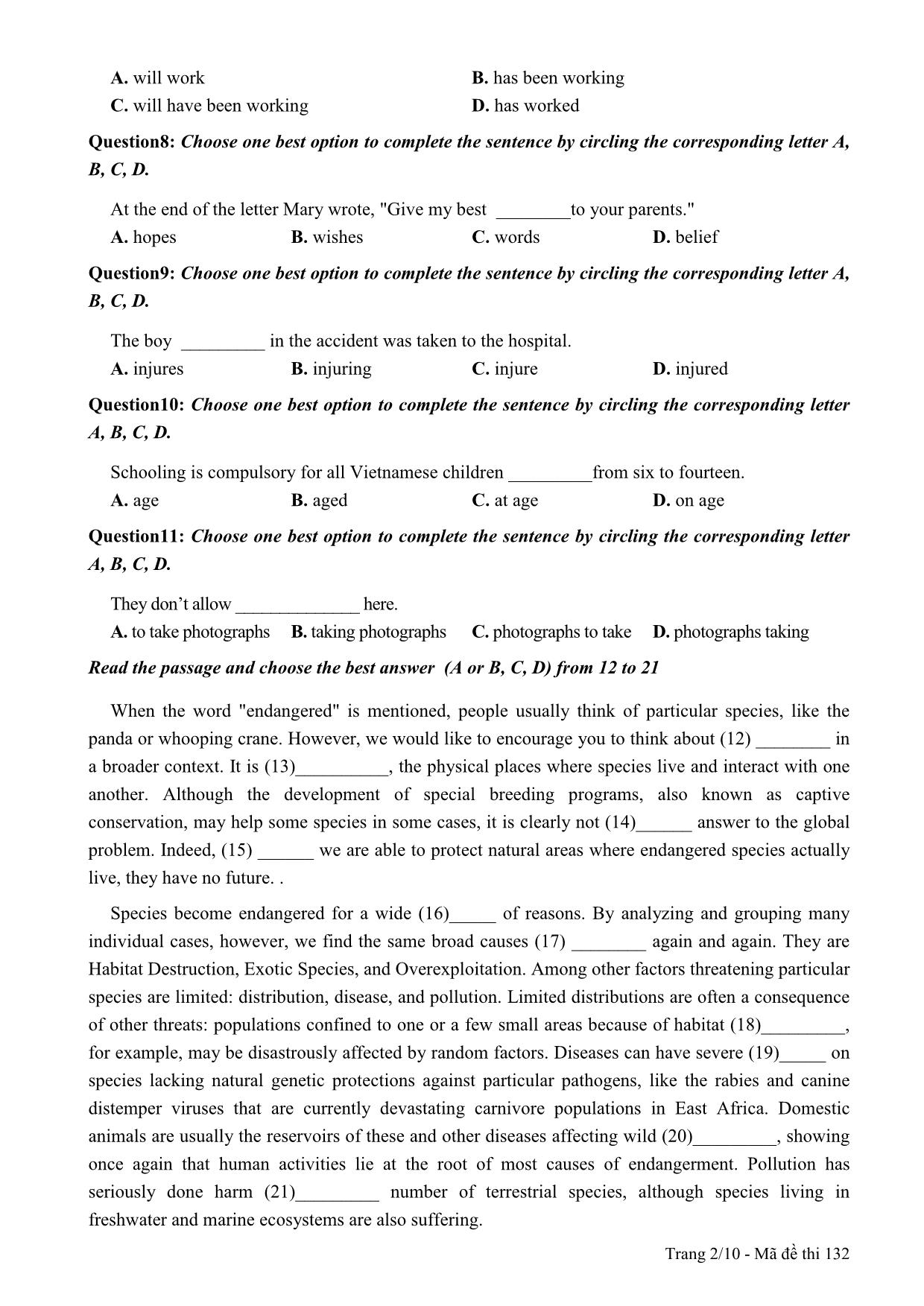
Trang 2
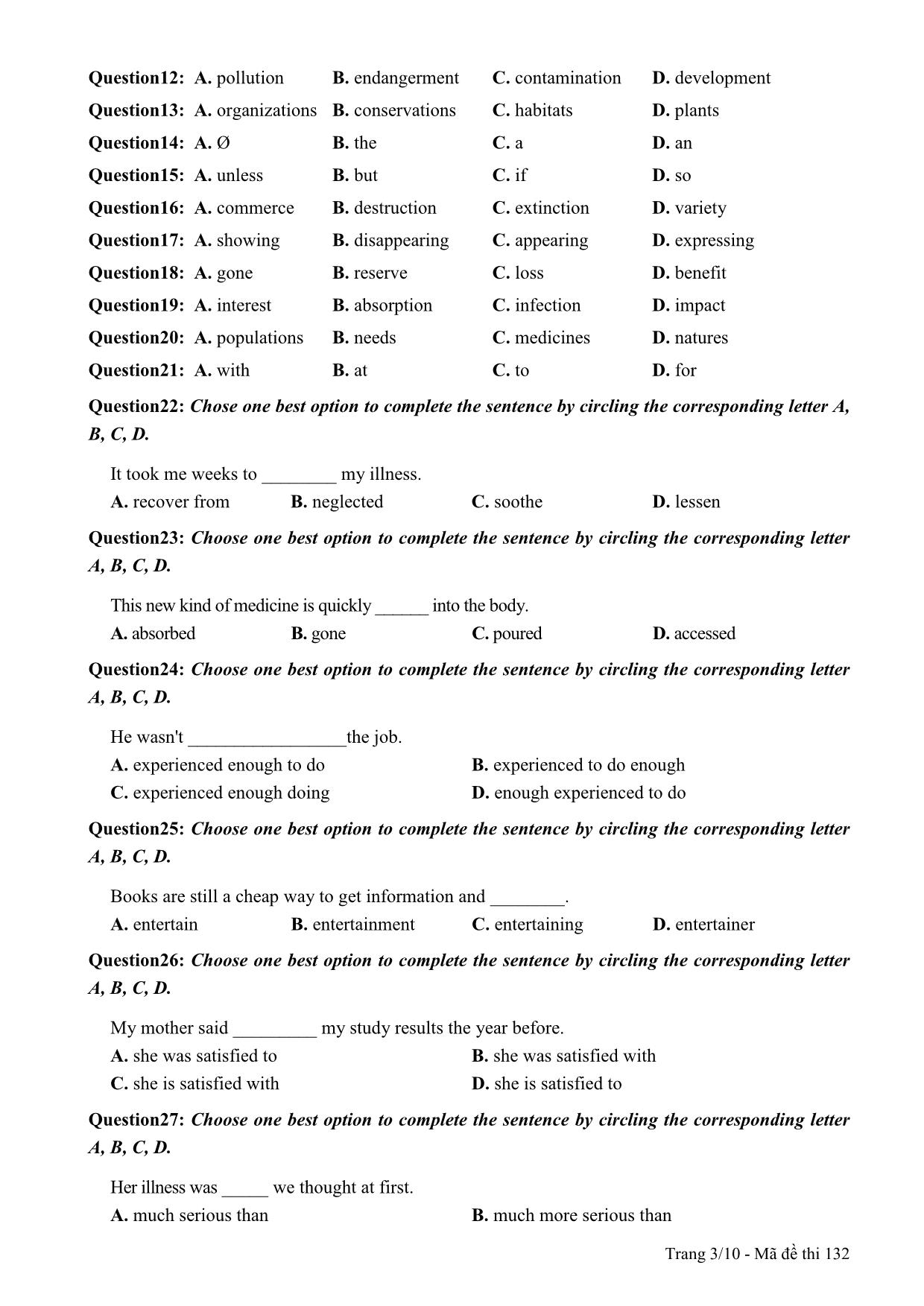
Trang 3
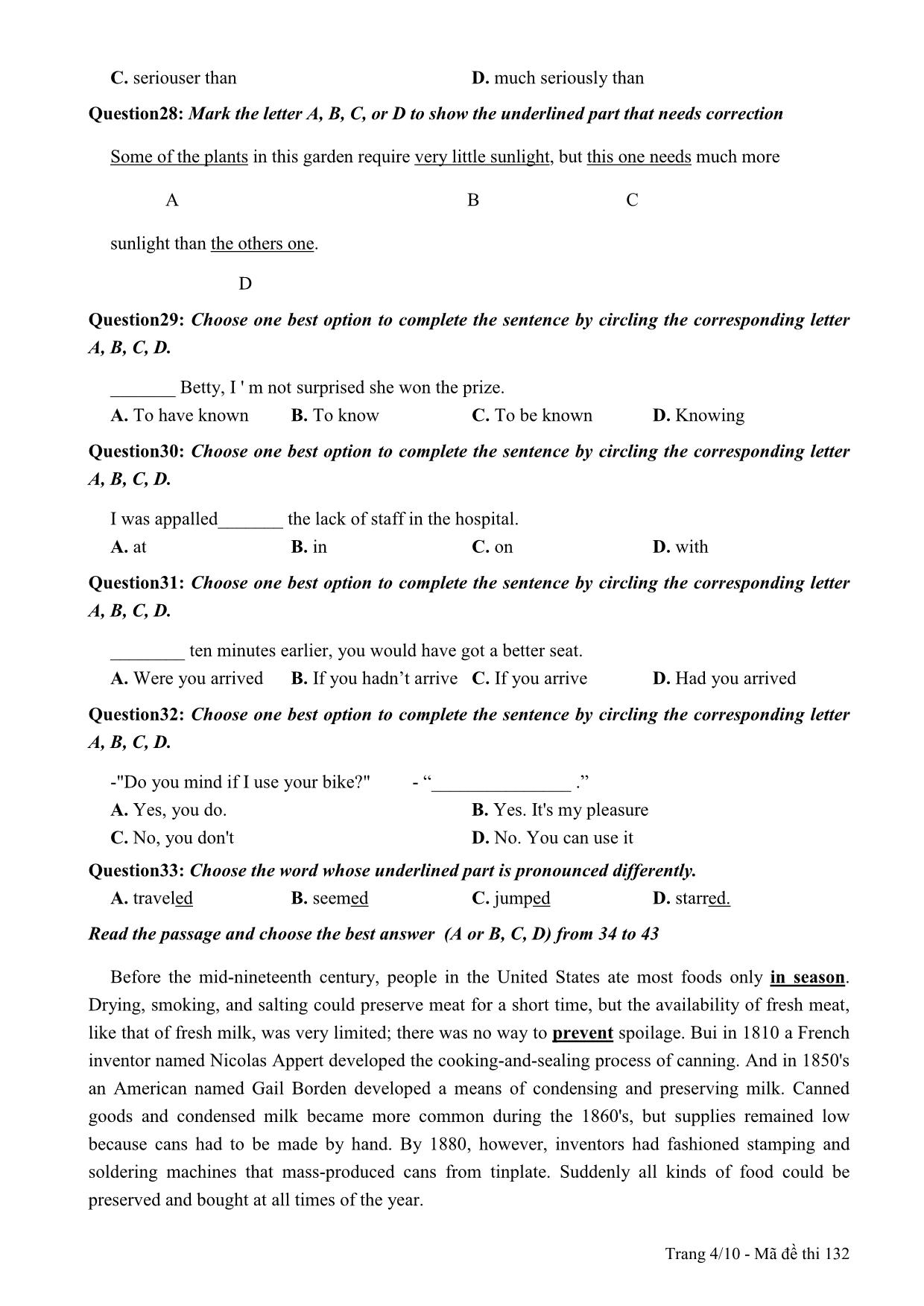
Trang 4
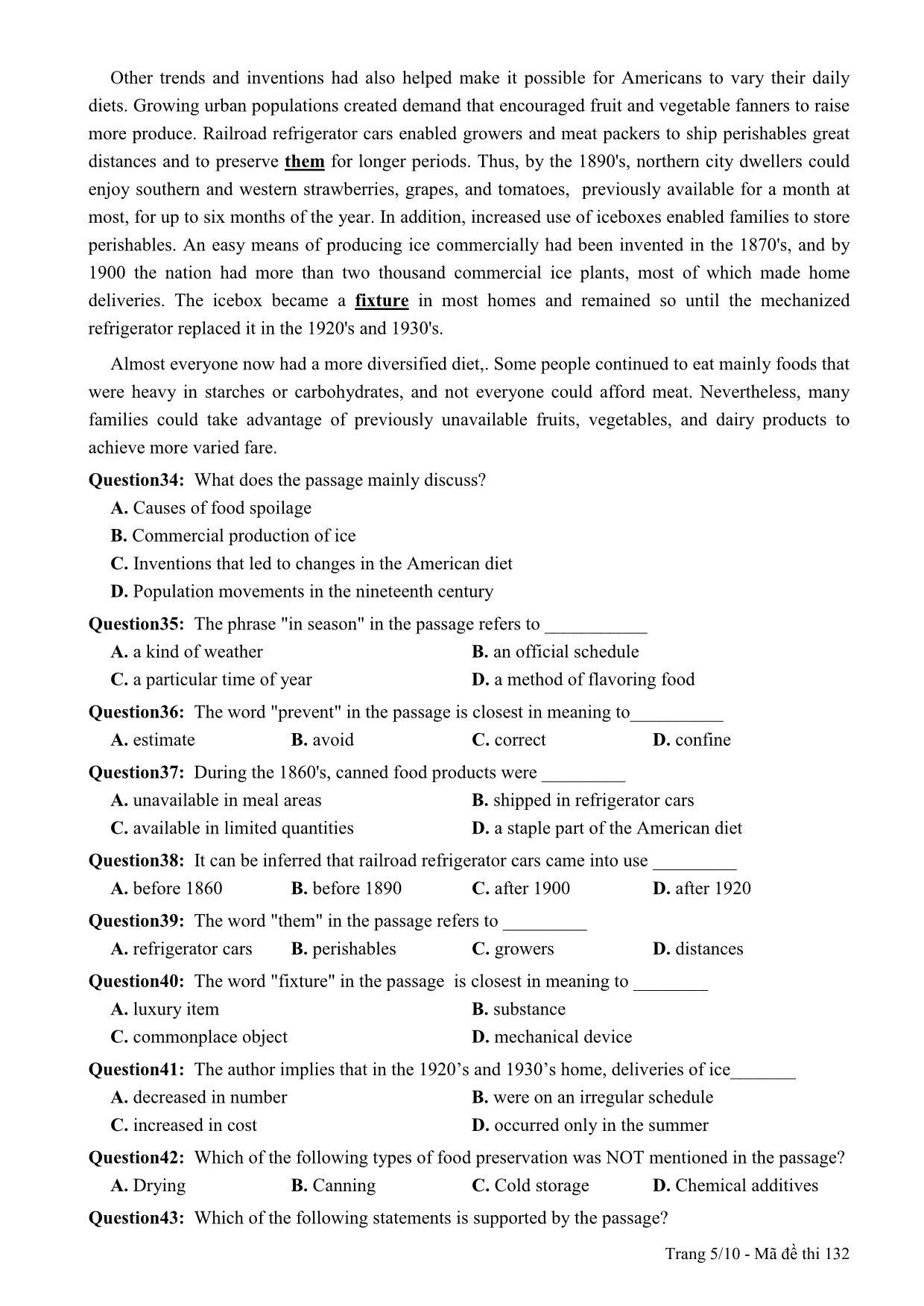
Trang 5
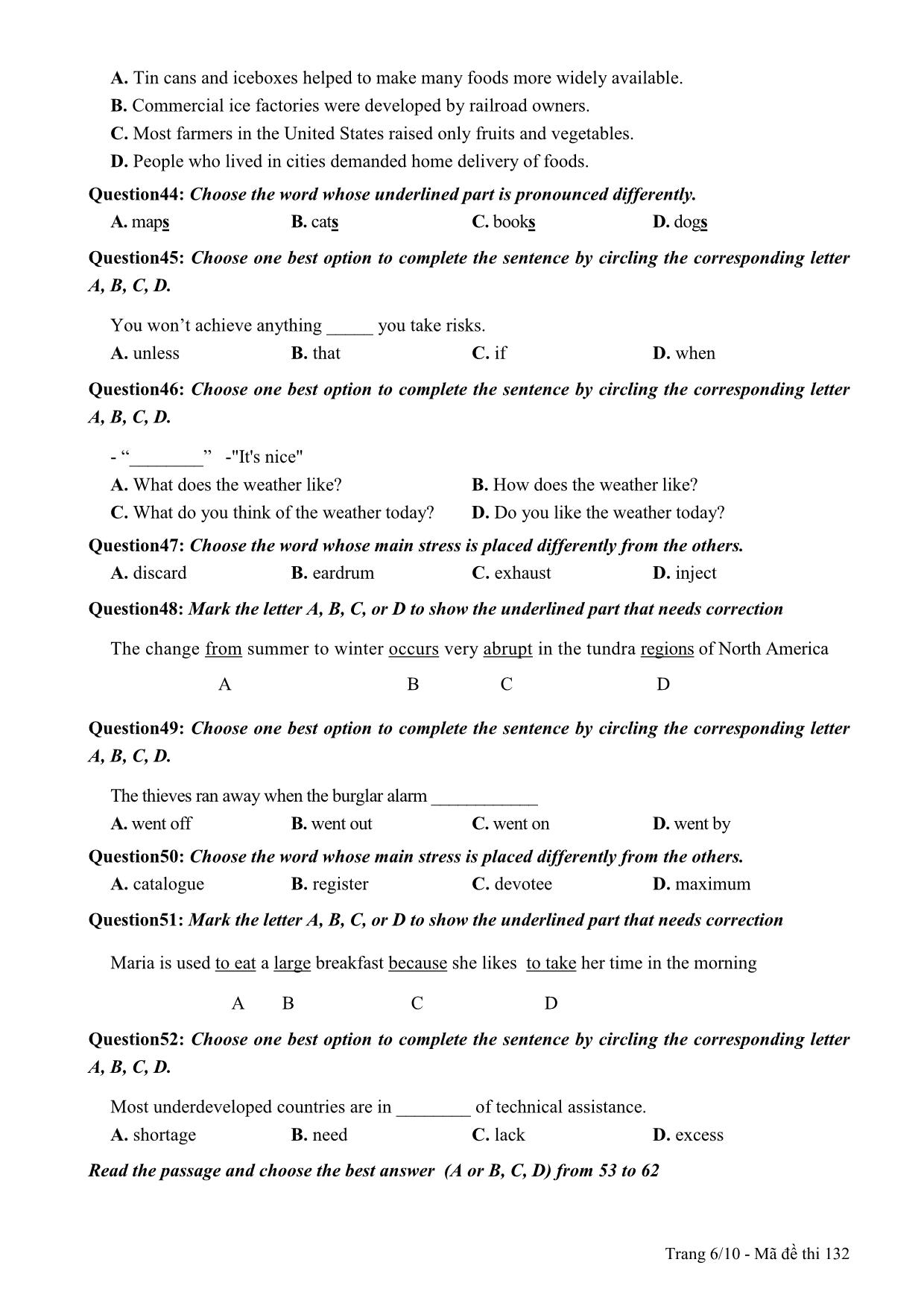
Trang 6
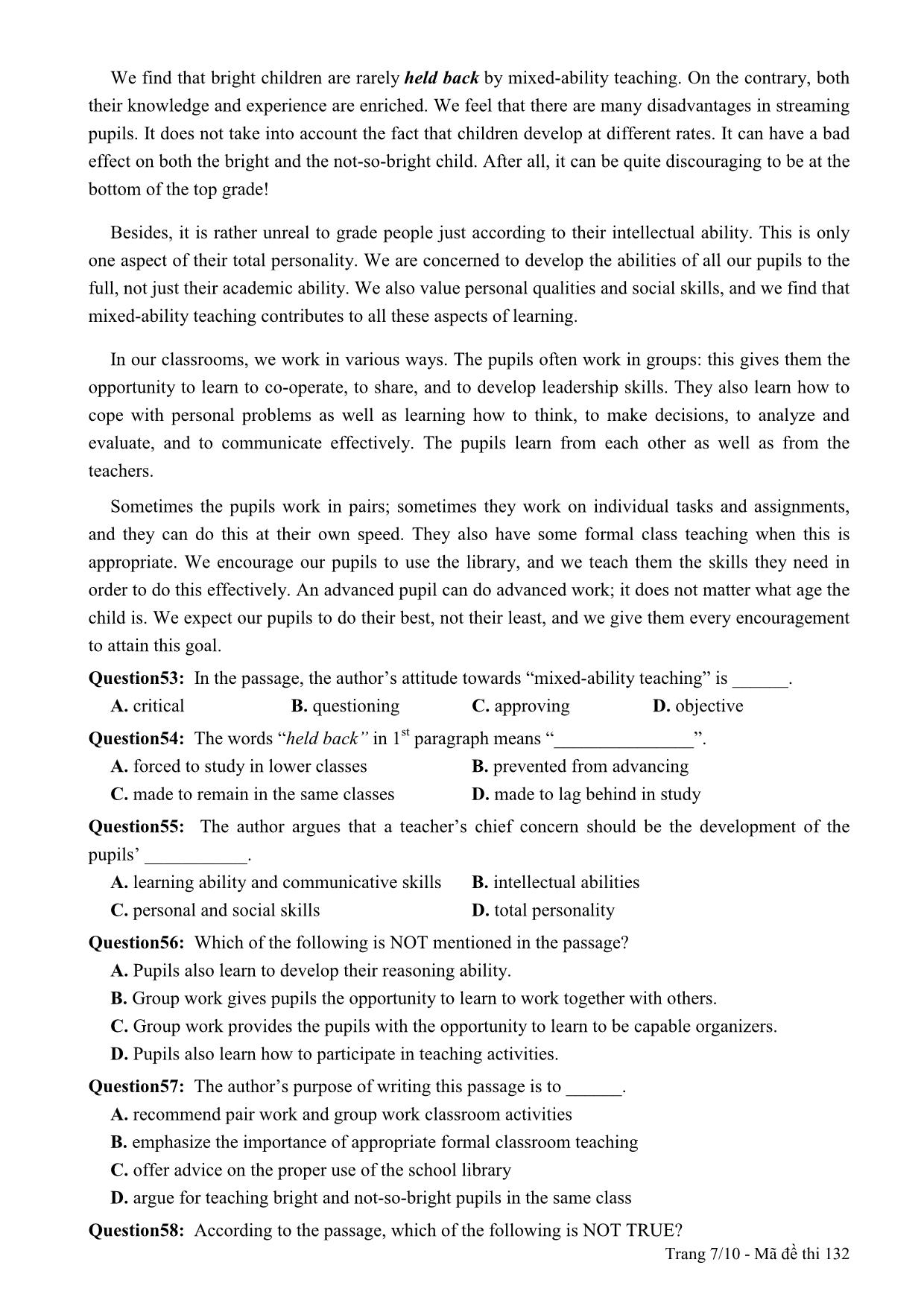
Trang 7
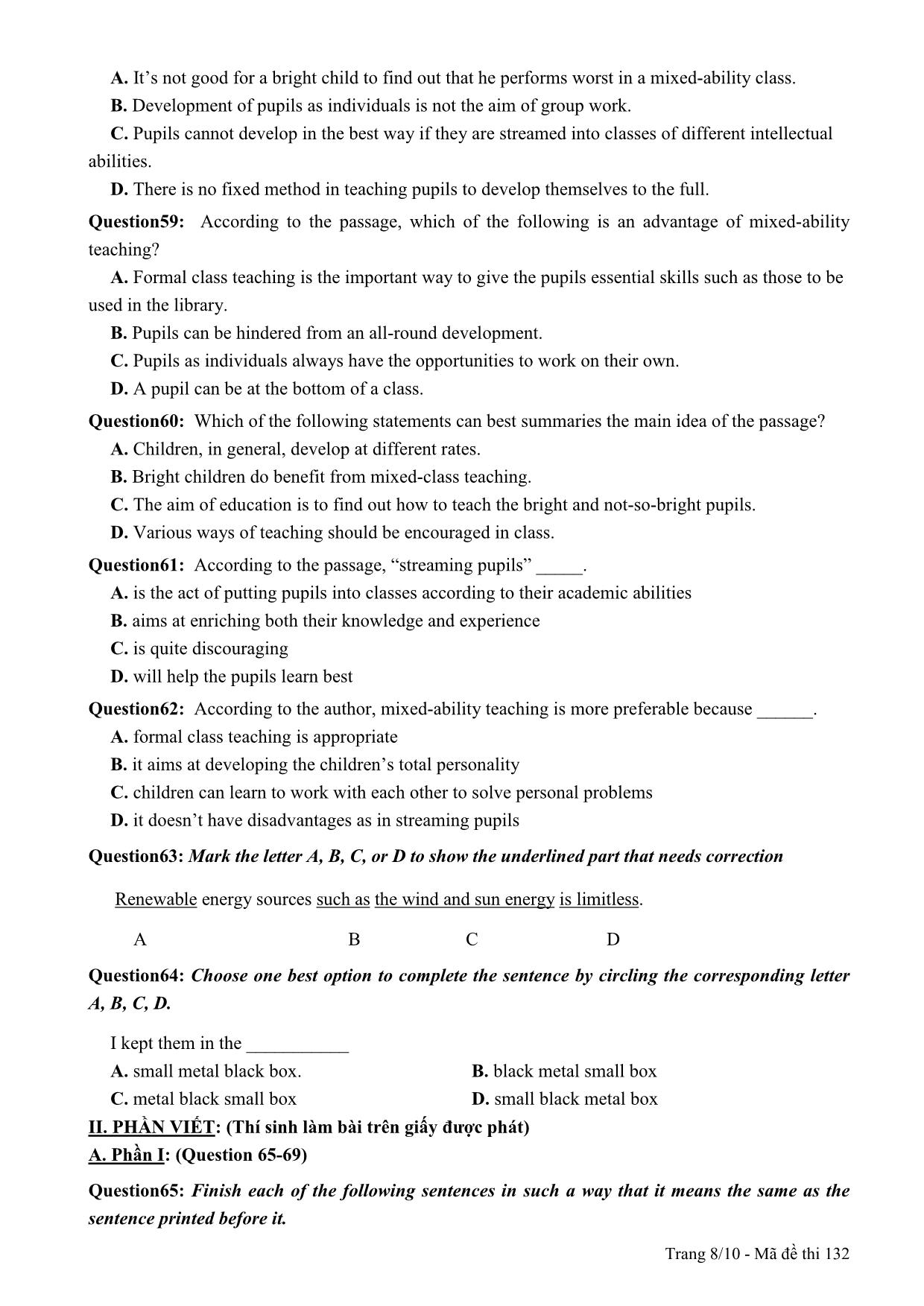
Trang 8
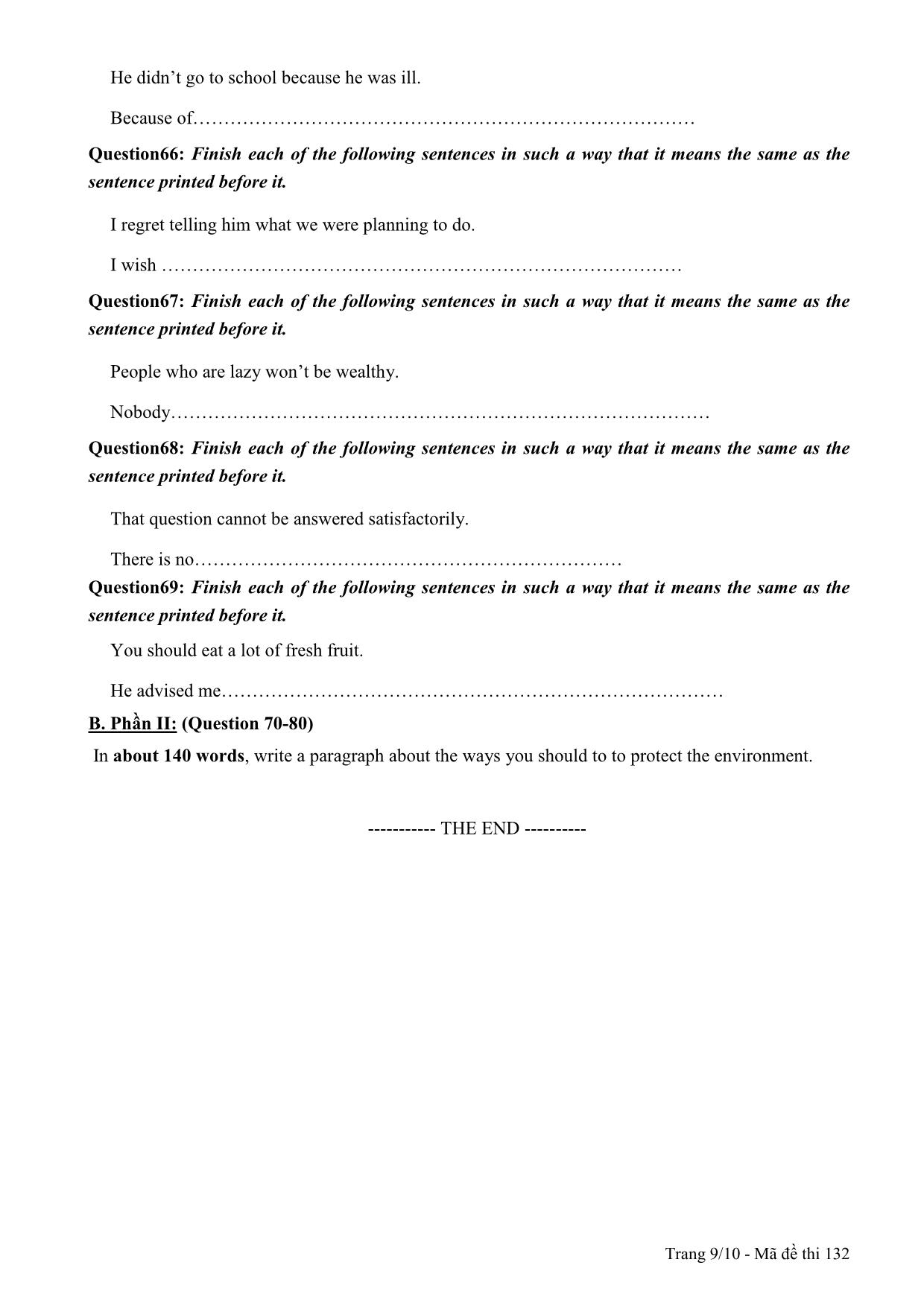
Trang 9
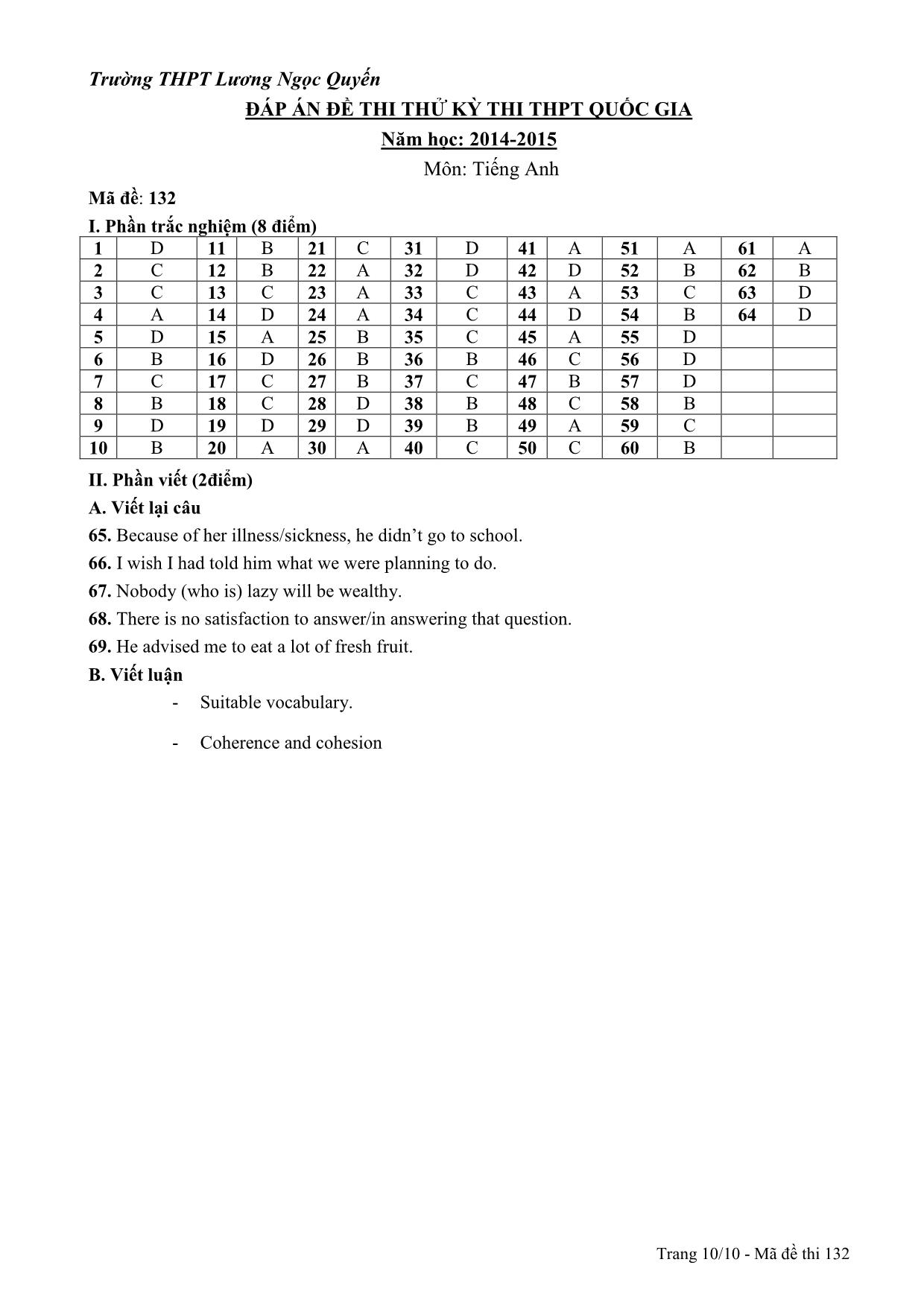
Trang 10
Tóm tắt nội dung tài liệu: Đề thi thử THPT Quốc gia môn Tiếng Anh - Mã đề 132 - Năm học 2014-2015 - Trường THPT Lương Ngọc Quyến (Có đáp án)
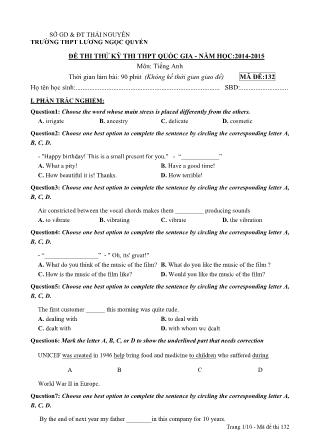
rresponding letter A, B, C, D. Her illness was _____ we thought at first. A. much serious than B. much more serious than Trang 4/10 - Mã đề thi 132 C. seriouser than D. much seriously than Question28: Mark the letter A, B, C, or D to show the underlined part that needs correction Some of the plants in this garden require very little sunlight, but this one needs much more A B C sunlight than the others one. D Question29: Choose one best option to complete the sentence by circling the corresponding letter A, B, C, D. _______ Betty, I ' m not surprised she won the prize. A. To have known B. To know C. To be known D. Knowing Question30: Choose one best option to complete the sentence by circling the corresponding letter A, B, C, D. I was appalled_______ the lack of staff in the hospital. A. at B. in C. on D. with Question31: Choose one best option to complete the sentence by circling the corresponding letter A, B, C, D. ________ ten minutes earlier, you would have got a better seat. A. Were you arrived B. If you hadn’t arrive C. If you arrive D. Had you arrived Question32: Choose one best option to complete the sentence by circling the corresponding letter A, B, C, D. -"Do you mind if I use your bike?" - “_______________ .” A. Yes, you do. B. Yes. It's my pleasure C. No, you don't D. No. You can use it Question33: Choose the word whose underlined part is pronounced differently. A. traveled B. seemed C. jumped D. starred. Read the passage and choose the best answer (A or B, C, D) from 34 to 43 Before the mid-nineteenth century, people in the United States ate most foods only in season. Drying, smoking, and salting could preserve meat for a short time, but the availability of fresh meat, like that of fresh milk, was very limited; there was no way to prevent spoilage. Bui in 1810 a French inventor named Nicolas Appert developed the cooking-and-sealing process of canning. And in 1850's an American named Gail Borden developed a means of condensing and preserving milk. Canned goods and condensed milk became more common during the 1860's, but supplies remained low because cans had to be made by hand. By 1880, however, inventors had fashioned stamping and soldering machines that mass-produced cans from tinplate. Suddenly all kinds of food could be preserved and bought at all times of the year. Trang 5/10 - Mã đề thi 132 Other trends and inventions had also helped make it possible for Americans to vary their daily diets. Growing urban populations created demand that encouraged fruit and vegetable fanners to raise more produce. Railroad refrigerator cars enabled growers and meat packers to ship perishables great distances and to preserve them for longer periods. Thus, by the 1890's, northern city dwellers could enjoy southern and western strawberries, grapes, and tomatoes, previously available for a month at most, for up to six months of the year. In addition, increased use of iceboxes enabled families to store perishables. An easy means of producing ice commercially had been invented in the 1870's, and by 1900 the nation had more than two thousand commercial ice plants, most of which made home deliveries. The icebox became a fixture in most homes and remained so until the mechanized refrigerator replaced it in the 1920's and 1930's. Almost everyone now had a more diversified diet,. Some people continued to eat mainly foods that were heavy in starches or carbohydrates, and not everyone could afford meat. Nevertheless, many families could take advantage of previously unavailable fruits, vegetables, and dairy products to achieve more varied fare. Question34: What does the passage mainly discuss? A. Causes of food spoilage B. Commercial production of ice C. Inventions that led to changes in the American diet D. Population movements in the nineteenth century Question35: The phrase "in season" in the passage refers to ___________ A. a kind of weather B. an official schedule C. a particular time of year D. a method of flavoring food Question36: The word "prevent" in the passage is closest in meaning to__________ A. estimate B. avoid C. correct D. confine Question37: During the 1860's, canned food products were _________ A. unavailable in meal areas B. shipped in refrigerator cars C. available in limited quantities D. a staple part of the American diet Question38: It can be inferred that railroad refrigerator cars came into use _________ A. before 1860 B. before 1890 C. after 1900 D. after 1920 Question39: The word "them" in the passage refers to _________ A. refrigerator cars B. perishables C. growers D. distances Question40: The word "fixture" in the passage is closest in meaning to ________ A. luxury item B. substance C. commonplace object D. mechanical device Question41: The author implies that in the 1920’s and 1930’s home, deliveries of ice_______ A. decreased in number B. were on an irregular schedule C. increased in cost D. occurred only in the summer Question42: Which of the following types of food preservation was NOT mentioned in the passage? A. Drying B. Canning C. Cold storage D. Chemical additives Question43: Which of the following statements is supported by the passage? Trang 6/10 - Mã đề thi 132 A. Tin cans and iceboxes helped to make many foods more widely available. B. Commercial ice factories were developed by railroad owners. C. Most farmers in the United States raised only fruits and vegetables. D. People who lived in cities demanded home delivery of foods. Question44: Choose the word whose underlined part is pronounced differently. A. maps B. cats C. books D. dogs Question45: Choose one best option to complete the sentence by circling the corresponding letter A, B, C, D. You won’t achieve anything _____ you take risks. A. unless B. that C. if D. when Question46: Choose one best option to complete the sentence by circling the corresponding letter A, B, C, D. - “________” -"It's nice" A. What does the weather like? B. How does the weather like? C. What do you think of the weather today? D. Do you like the weather today? Question47: Choose the word whose main stress is placed differently from the others. A. discard B. eardrum C. exhaust D. inject Question48: Mark the letter A, B, C, or D to show the underlined part that needs correction The change from summer to winter occurs very abrupt in the tundra regions of North America A B C D Question49: Choose one best option to complete the sentence by circling the corresponding letter A, B, C, D. The thieves ran away when the burglar alarm ____________ A. went off B. went out C. went on D. went by Question50: Choose the word whose main stress is placed differently from the others. A. catalogue B. register C. devotee D. maximum Question51: Mark the letter A, B, C, or D to show the underlined part that needs correction Maria is used to eat a large breakfast because she likes to take her time in the morning A B C D Question52: Choose one best option to complete the sentence by circling the corresponding letter A, B, C, D. Most underdeveloped countries are in ________ of technical assistance. A. shortage B. need C. lack D. excess Read the passage and choose the best answer (A or B, C, D) from 53 to 62 Trang 7/10 - Mã đề thi 132 We find that bright children are rarely held back by mixed-ability teaching. On the contrary, both their knowledge and experience are enriched. We feel that there are many disadvantages in streaming pupils. It does not take into account the fact that children develop at different rates. It can have a bad effect on both the bright and the not-so-bright child. After all, it can be quite discouraging to be at the bottom of the top grade! Besides, it is rather unreal to grade people just according to their intellectual ability. This is only one aspect of their total personality. We are concerned to develop the abilities of all our pupils to the full, not just their academic ability. We also value personal qualities and social skills, and we find that mixed-ability teaching contributes to all these aspects of learning. In our classrooms, we work in various ways. The pupils often work in groups: this gives them the opportunity to learn to co-operate, to share, and to develop leadership skills. They also learn how to cope with personal problems as well as learning how to think, to make decisions, to analyze and evaluate, and to communicate effectively. The pupils learn from each other as well as from the teachers. Sometimes the pupils work in pairs; sometimes they work on individual tasks and assignments, and they can do this at their own speed. They also have some formal class teaching when this is appropriate. We encourage our pupils to use the library, and we teach them the skills they need in order to do this effectively. An advanced pupil can do advanced work; it does not matter what age the child is. We expect our pupils to do their best, not their least, and we give them every encouragement to attain this goal. Question53: In the passage, the author’s attitude towards “mixed-ability teaching” is ______. A. critical B. questioning C. approving D. objective Question54: The words “held back” in 1st paragraph means “_______________”. A. forced to study in lower classes B. prevented from advancing C. made to remain in the same classes D. made to lag behind in study Question55: The author argues that a teacher’s chief concern should be the development of the pupils’ ___________. A. learning ability and communicative skills B. intellectual abilities C. personal and social skills D. total personality Question56: Which of the following is NOT mentioned in the passage? A. Pupils also learn to develop their reasoning ability. B. Group work gives pupils the opportunity to learn to work together with others. C. Group work provides the pupils with the opportunity to learn to be capable organizers. D. Pupils also learn how to participate in teaching activities. Question57: The author’s purpose of writing this passage is to ______. A. recommend pair work and group work classroom activities B. emphasize the importance of appropriate formal classroom teaching C. offer advice on the proper use of the school library D. argue for teaching bright and not-so-bright pupils in the same class Question58: According to the passage, which of the following is NOT TRUE? Trang 8/10 - Mã đề thi 132 A. It’s not good for a bright child to find out that he performs worst in a mixed-ability class. B. Development of pupils as individuals is not the aim of group work. C. Pupils cannot develop in the best way if they are streamed into classes of different intellectual abilities. D. There is no fixed method in teaching pupils to develop themselves to the full. Question59: According to the passage, which of the following is an advantage of mixed-ability teaching? A. Formal class teaching is the important way to give the pupils essential skills such as those to be used in the library. B. Pupils can be hindered from an all-round development. C. Pupils as individuals always have the opportunities to work on their own. D. A pupil can be at the bottom of a class. Question60: Which of the following statements can best summaries the main idea of the passage? A. Children, in general, develop at different rates. B. Bright children do benefit from mixed-class teaching. C. The aim of education is to find out how to teach the bright and not-so-bright pupils. D. Various ways of teaching should be encouraged in class. Question61: According to the passage, “streaming pupils” _____. A. is the act of putting pupils into classes according to their academic abilities B. aims at enriching both their knowledge and experience C. is quite discouraging D. will help the pupils learn best Question62: According to the author, mixed-ability teaching is more preferable because ______. A. formal class teaching is appropriate B. it aims at developing the children’s total personality C. children can learn to work with each other to solve personal problems D. it doesn’t have disadvantages as in streaming pupils Question63: Mark the letter A, B, C, or D to show the underlined part that needs correction Renewable energy sources such as the wind and sun energy is limitless. A B C D Question64: Choose one best option to complete the sentence by circling the corresponding letter A, B, C, D. I kept them in the ___________ A. small metal black box. B. black metal small box C. metal black small box D. small black metal box II. PHẦN VIẾT: (Thí sinh làm bài trên giấy được phát) A. Phần I: (Question 65-69) Question65: Finish each of the following sentences in such a way that it means the same as the sentence printed before it. Trang 9/10 - Mã đề thi 132 He didn’t go to school because he was ill. Because of Question66: Finish each of the following sentences in such a way that it means the same as the sentence printed before it. I regret telling him what we were planning to do. I wish Question67: Finish each of the following sentences in such a way that it means the same as the sentence printed before it. People who are lazy won’t be wealthy. Nobody Question68: Finish each of the following sentences in such a way that it means the same as the sentence printed before it. That question cannot be answered satisfactorily. There is no Question69: Finish each of the following sentences in such a way that it means the same as the sentence printed before it. You should eat a lot of fresh fruit. He advised me B. Phần II: (Question 70-80) In about 140 words, write a paragraph about the ways you should to to protect the environment. ----------------------------------------------- ----------- THE END ---------- Trang 10/10 - Mã đề thi 132 Trường THPT Lương Ngọc Quyến ĐÁP ÁN ĐỀ THI THỬ KỲ THI THPT QUỐC GIA Năm học: 2014-2015 Môn: Tiếng Anh Mã đề: 132 I. Phần trắc nghiệm (8 điểm) 1 D 11 B 21 C 31 D 41 A 51 A 61 A 2 C 12 B 22 A 32 D 42 D 52 B 62 B 3 C 13 C 23 A 33 C 43 A 53 C 63 D 4 A 14 D 24 A 34 C 44 D 54 B 64 D 5 D 15 A 25 B 35 C 45 A 55 D 6 B 16 D 26 B 36 B 46 C 56 D 7 C 17 C 27 B 37 C 47 B 57 D 8 B 18 C 28 D 38 B 48 C 58 B 9 D 19 D 29 D 39 B 49 A 59 C 10 B 20 A 30 A 40 C 50 C 60 B II. Phần viết (2điểm) A. Viết lại câu 65. Because of her illness/sickness, he didn’t go to school. 66. I wish I had told him what we were planning to do. 67. Nobody (who is) lazy will be wealthy. 68. There is no satisfaction to answer/in answering that question. 69. He advised me to eat a lot of fresh fruit. B. Viết luận - Suitable vocabulary. - Coherence and cohesion
File đính kèm:
 de_thi_thu_thpt_quoc_gia_mon_tieng_anh_ma_de_132_nam_hoc_201.pdf
de_thi_thu_thpt_quoc_gia_mon_tieng_anh_ma_de_132_nam_hoc_201.pdf

